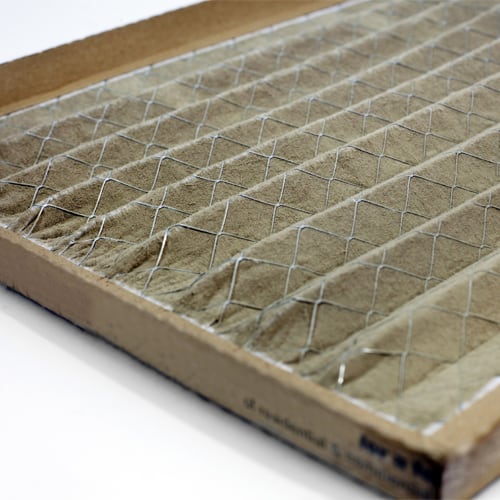What MERV Rating Should I Use at Home?
Indoor air quality is always important, but if you are one of the many following stay-at-home orders you might not be getting a lot of fresh air. Often air quality in commercial spaces is better than homes, mostly because companies are required to maintain their buildings.
Is Your Furnace Filter Overloaded?
Now that you are home most of the time, you may be noticing things such as:
- Getting short of breath with little activity
- Unable to take deep breaths
- Dryness and irritation of the eyes
- Frequent headaches
- Sinus congestion
These are symptoms of poor indoor air quality. People with allergies, asthma, or other breathing problems will have more severe symptoms that are harder to treat if you do not take measures to create a healthy indoor atmosphere.

One of the best ways that you can keep your indoor air quality high is to maintain your HVAC system, specifically your filter. Although it is often referred to as a furnace filter, the filter in your HVAC unit works throughout the year, whether you are running the heat or the air conditioner. Changing this filter routinely throughout the year is necessary to maintain air quality.
In addition to making sure you are using a clean filter, you should also pay attention to the quality of the filter you use. Not all filters are created equal. Some are better at filtering out small particles than others. In fact, the highest rated filters can even filter out cigarette smoke.
We recommend that everyone uses an HVAC filter that has a MERV rating of 8 or higher. This guide will help you understand what the MERV rating is, why it’s important, and how you can choose the right filter for your home.
Types of HVAC Filters
There are many different types of HVAC filters. Most homeowners and renters use the cheapest filter of the correct size for their unit. However, these cheaper filters are not nearly as effective at cleaning your air. Most HVAC systems can take different types of filters, as long as they are the appropriate size. You can also get an upgrade to your system so that you can use a more effective filter.
The most common types of filters are:
- Fiberglass
- Electrostatic
- Pleated
Fiberglass filters are the cheapest, and they do the least for your indoor air quality. They have to be replaced every month, so even though the per unit cost is low, they could cost you more over time.
Electrostatic filters are reusable, which is cost saving as well as better for the environment. They have to be cleaned with water and possibly a mild detergent once a month. Unfortunately, although these are the best for the environment, they are also highly ineffective at filtering out small particles.
The best HVAC filters are pleated. A pleated filter has more surface area to catch particles from air circulating in the unit. Pleated filters are often one-inch filters, coming in sizes to fit most HVAC units. Some higher end units may require a 4 to 6-inch pleated filter. If anyone in your household has allergies, asthma, or other breathing difficulties, you can opt to have your HVAC system upgraded to accept the thicker pleated filters.
Choosing an HVAC Filter
There are a lot of factors to consider when you are choosing the right HVAC filter. You may be able to determine the right filter for your family by considering the following factors.
Does anyone in your home have medical concerns? Indoor air quality directly affects certain medical conditions, including:
- Allergies
- Asthma
- COPD
- Other pulmonary conditions
Higher rated filters are best for people with these medical concerns. The better the filter, the cleaner the air. The cleaner the air, the easier everyone breathes.
You also need to think about your household’s habits, as well as basics about your home. For example:
- Do you have pets?
- Do you often keep your doors and windows open?
- Are you a smoker?
If the answer to any of these is “yes,” you should get a higher rated filter. These factors add to the particles in your home, which in turn are going through the filter. In addition, if you have several of these factors in your household you may need to change your filter more frequently than recommended.
What is a MERV Rating?
So how are filters rated? The Minimum Efficiency Reporting Value, or MERV rating is the standard for ranking filters for air quality. This scale was designed by the American Society of Heating, Cooling, and Air-Conditioning Engineers in 1987. The higher the MERV rating, the smaller the particles filtered out of the air.
The MERV rating is based on the effectiveness of the filter and how many particles are removed from the air.
- MERV 1-4: Carpet fibers, cockroach debris, dust mites, pollen, sanding dust, spray paint dust, and textile fibers.
- MERV 5-8: Dust mites, dusting aids, fabric protector, hair spray, mold spores, and pet dander.
- MERV 9-12: Humidifier dust, nebulizer droplets, legionella
- MERV 13-16: Bacteria, saliva droplets, and dust from smoke.
As a general rule, residences do not use higher than MERV 8 filters. We do recommend that everyone uses filters that have at least an 8 MERV rating. These filters will remove the majority of pollutants from your indoor air. If you have serious medical conditions making it difficult to breathe, you might want to get a filter with MERV 9-12 rating. MERV 13 to 16 ratings are usually reserved for filters for labs, hospitals, and operating rooms.
Why We Recommend MERV Rating of 8 or Higher
The better your filter, the cleaner your air. There are several benefits of using a MERV 8 filter. The most significant of these are:
- Protects your HVAC system from dust clogs and corrosive particles.
- Reduces dust in your home making for less housework.
- Improving indoor air quality, especially when you are spending a lot of time at home, is important for your health.
- Cost effective, and only need to be changed about every three months.
Just a few of the health benefits of cleaner indoor air include:
- Reduced allergy and asthma symptoms
- Easier breathing
- Fewer respiratory infections or respiratory illness
A MERV 8 filter will provide all of these benefits and more. Going with a cheaper, less effective filter could put your family and HVAC system at risk.
Getting a New MERV 8 HVAC Filter Installed
Getting your furnace filter replaced is part of the basic HVAC maintenance that should be done on a routine basis. It is basic preventative maintenance for your air conditioner. While we are installing your new HVAC filter, we can also inspect your unit and provide other maintenance.
It is also very easy to upgrade your filter. Most HVAC systems are able to accept different types of filters as long as they are the same size. If your system won’t allow for a MERV 8 filter, we can upgrade your system to take the better filter.
We also offer indoor air quality solutions that can further improve the air quality in your home. This is highly recommended if you have a smoker in the home, or if anyone has serious health conditions. These indoor air quality systems will further improve the quality of your indoor air, as well as take some of the burden off of your HVAC filter.
We are Open
We are committed to staying open so that we can meet your HVAC and air conditioning maintenance needs. Summer is creeping up on us, and stay-at-home orders may be extended. It is important to have clean air and a well-functioning air conditioner. When our technicians come to your home, they will take all appropriate precautions, including maintaining social distancing measures. Contact us today if you need an HVAC filter upgrade.

5636 Bush River Rd.
Columbia, SC 29212
SC License – #M104545
NC License – #32356
Phone: (803) 794-5526

